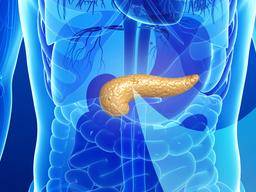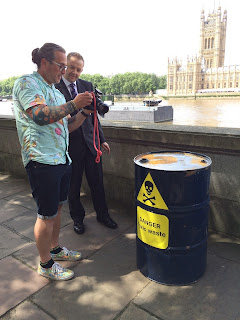Five things you might not know about the pancreas
November is Pancreatic Cancer Awareness month. (Funnily enough, this passed me by last November.) As the month draws to a close I thought I would mark the occasion by providing you with a blog on some things you might not know about the pancreas (an underrated organ if ever there was one).
Please note, apart from some basic biology dredged up from my memory, most of this is gleaned from Google search so - as they say - please don't rely on this for any medical or diagnostic purposes. If you need to, talk to a proper medical doctor.
1. We all have one (but can survive without one)
Your pancreas is a leaf-shaped gland, about 15 cm long, which curls around the back of your stomach, just in front of your spine. It has a good blood supply and a duct or tube which empties into the small intestine just below the stomach.

Secondly, it produces insulin and other hormones which pass directly into the blood. These include insulin and glucagon which regulate the amount of sugar in the blood. A shortage of insulin means that this regulation doesn't happen - and that of course results in diabetes. Very occasionally babies are born with a pancreas that produces too much insulin (hyperinsulinism). I have a friend with three children with diabetes* and another friend/ relative whose son was born with hyperinsulinism - both hugely challenging situations to live with, and I have huge admiration for them both.
Surprisingly, you can survive without a pancreas, but of course you need to replace the enzymes and hormones it produces. For the last year, I've been taking pancreatic enzyme supplements to help me digest my food.
2. There are two main types of pancreatic cancer
The more common one is a cancer of the cells lining the ducts which carry the pancreatic enzymes to the intestine. This accounts for about 80% of cases. This is the one I have, and unfortunately it is also the more agressive and fast-growing type.
The other main but less common type is a cancer of the endocrine cells which produce the hormones. Then there are also some other much rarer types of cancer too.
Pancreatic cancer is difficult to diagnose - because the symptoms are quite general (see below) and also difficult to treat with surgery because the pancreas is so deep in the body. And unfortunately that excellent blood supply means that any cancer easily spreads elsewhere.
3. You can eat pancreas
When it's in the kitchen, it's known as 'sweetbread'. I have to admit, I don't fancy it.
4. Pancreatic cancer is the 10th most common cancer in the UK
Just over 10,000 people are diagnosed with it each year. It's also one of the most lethal. Cancer Research UK quotes figures that in England around 25% of people survive for a year or more after diagnosis, and more than 5% survive five years or more.
Before I was diagnosed, I knew two people who had had pancreatic cancer.
The first was Sheila, who I used to sit next to in the choir at All Hallows. A warm and wise woman with a wicked sense of humour, she was only diagnosed after a scan following a fall. I think she may have been in pain for months. She died within a few months of diagnosis. I still miss her.
The second was Pam, who we knew through her husband Ray who sang in the same choir as us in Southampton. Pam and Ray were living in Singapore at the time she was diagnosed but we were able to follow her progress through Ray's regular updates. Pam was a very talented quilter, and as Ray wrote recently, 'She continued living her life to the best she could and sewing until a few short weeks before she died.' We miss Pam too.
5. Here are the symptoms of pancreatic cancer
Pain or discomfort in the abdomen. I had pain for weeks before I did anything about it. Someone else I spoke to just had what felt like indigestion. Clearly I should have done something sooner but I can't re-live my life so there is no point in having regrets. But if you are reading this, and you have pain or even discomfort that goes on for more than a few weeks, get it checked.
Unexplained weight loss. I had lost weight - I remember noticing how loose my watch was. I was quite pleased and put it down to the fact that I'd taken up running.
Loss of appetite. And I had this too. I remember sitting down for meals with the family and serving myself small portions because I just didn't feel like eating. But weirdly once I started to eat my appetite returned and I would often then have seconds...
Jaundice (yellow skin/eyes) - this happens because the cancer can block the bile duct from the liver which leads to a build up of bile in the bloodstream. I didn't have this - probably because my cancer is in the body of the pancreas, further away from the bile duct.
Bowel changes - another classic symptom of pancreatic cancer is light coloured floaty smelly poo (it floats because the food isn't being digested fully and contains too much fat, which is lighter than water). There are some things which even I don't want to share...
As I said at the top, I'm not a medical doctor. I'm not an expert. But I do think that we all need to be a bit more aware of these symptoms.
If you - or someone you know - does have any of them - don't panic, pancreatic cancer is uncommon, and there are many other things it could well be.
But do go and see a doctor, and ask for a scan.
This blog is dedicated to my inspirational friends Clare and Helen, both of whose lives have been turned upside down by this strange organ. And of course to the memory of Sheila and Pam.
* Search and follow 'Mum of 3T1' on Facebook.




Comments
Post a Comment